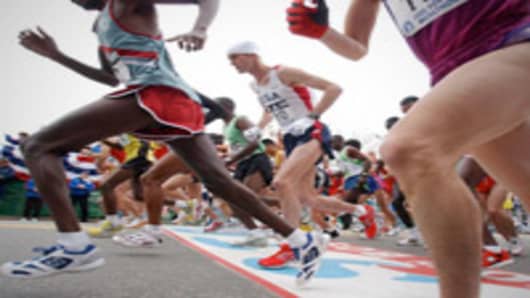A great piece written by my producer Tom Rotunno...
Don’t be surprised if the 113th running of the Boston Marathon turns into a sequel for Chariots of Fire. Only this time, it is anyone named Cheruiyot who is on fire. There's four-time Boston winner Robert Kipkoech Cheruiyot, Evans Cheruiyot and Robert Kiprono Cheruiyot.
No matter how the Cheruiyot’s (who are not related) perform, you can bet a Kenyan will vie for the top spot today. A Kenyan has won Boston 16 out of the last 18 years.
While the Cheruiyots are the talk of Beantown, the news for the many other Kenyan runners is not as good. The global credit crisis may be starting to leave its mark on the world of marathons. It’s not because three of the five largest marathons in the world happen to be sponsored by financial companies: the New York Marathon by ING Bank, Chicago Marathon by Bank of America and Boston Marathon by John Hancock Financial (London is sponsored by the food manufacturing company Flora and the Berlin Marathon by the German retail chain Real Hypermarkets). Most of those races have long-term contracts locked in and appear to be safe for now.
It’s actually the lower- to mid-tier marathons that might be feeling the strain.
Gerard van der Veen is an agent with Volare Sports, an athlete and sports event management company based in the Netherlands. The company represents as many as 25 Kenyan runners. Van der Veen told the East African newspaper that while the major marathons are currently not affected, the mid-tier marathons like Amsterdam, Paris and Vienna are feeling the crunch. According to van der Veen, the races at this level are losing sponsors or cutting budget -- sometimes by as much as a third. He’s advising his runners to expect drastic reduction in appearance fees and earnings, somewhere in the neighborhood of 50 percent.




